Tổng hợp bài tập Ngữ pháp - Ôn hè Tiếng Anh lớp 4
Tải vềTổng hợp bài tập Ngữ pháp ôn hè Tiếng Anh lớp 4
Đề bài
Bài 1. Read and choose the correct answer.
1. Hi, Jenny. Nice to meet you.
a. Bye, Jenny.
b. I'm fine.
c. Nice to meet you, too.
2. Good morning. I'm Matt.
a. Good morning, Matt.
b. I'm ten.
c. This is Jenny.
3. Good night, Lucy.
a. Goodbye, daddy.
b. Good night, daddy.
c. Good evening, daddy.
4. Goodbye, Miss Hien.
a. Good afternoon, Lisa.
b. Bye. See you later, Lisa.
c. Hello, Lisa.
Bài 2. Make sentences from clues.
1. Who/ that/?
_____________?
2. He/friend/.
_____________.
3. What/ his/ full/?
_____________?
4. His/ Tim Brown/.
_____________.
5. Where/ he/ from/?
_____________?
6. He/ America/.
_____________.
Bài 3. Write the words in order.
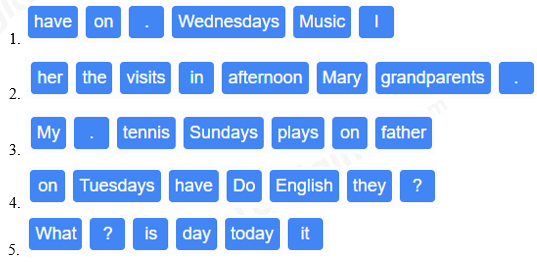
4. Write the answers to the questions.

1. What's the date today, Nam? - It's on ________.
2. When's Lucy's birthday? - It's on ________.
3. Today is my birthday. - It's on ________.
4. What's the date today, Dad? - It's ________.
5. When's your birthday, Tony? - It's on ________.
6. When's your mother's birthday? - It's on ________.
Bài 5. Match the questions with the appropriate answers.
|
1. Can you play chess? 2. What can you do? 3. What can he do? 4. Can he use the chopsticks? |
a. He can ride the pony. b. Yes, I can do a magic tick. c. No, he cant’. He can use the spoons only. d. No, I can’t. |
Bài 6. Reorder the words to make the correct sentences.
1. is/ . / 4A / in / Class / Hoa
2. ? / you / in / What / are / class
3. . / school / My / is / in / street / Quang Trung
4. Primary / school / Hoa / Where / Sen / is / ?
5. a / small / village / Her / school / is / . / in
Bài 7. Write the missing letters.
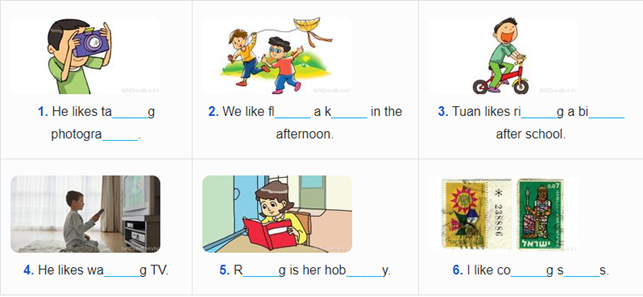
Bài 8. Fill the missing words.
|
love Science favourite subjects When on |
1. What _______ do you have today?
2. Maths, Art, and Music.
3. What's your _______ subject?
4. Oh, I _______ English.
5. _______ do you have English?
6. I have it _______ Mondays, Tuesdays, Thursdays and Friday.
Bài 9. Write the words in order to make the correct sentences.
1. English/ she/ Is/ speaking/ aloud/ ?
_________?
2. These/ are / games/ ./ pupils/ playing
_________.
3. girls / listening / music/ ?/ two/ Are/ to
_________?
4. are/ into / our/ running/ desks / quickly/ ./ We
_________.
5. your/ in front of / teacher / ?/ standing / the / Is/ door
_________?
6. Some/ reading/ boys and girls/ are/ English/ books/.
_________.
Bài 10. Write the missing letters.
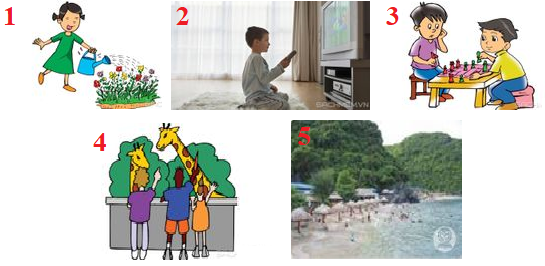
1. Tom: What d_____ you do?
Mary: I w____ the f____ in the garden.
2. Bill: What d____ your brother do after dinner?
Nam: He w____ TV.
3. Bill: D___ you fly a kite after school?
Nam: No, I d____n't. I played chess with Quan.
4. Phong: Wh___ we you yesterday?
Peter: I w____ at the z____ with my family.
5. Phong: Was Tony at the b____ yesterday?
Nam: No, he wa____n't. He was at home.
Bài 11. Choose the correct words/ phrases in the box to complete the sentences.
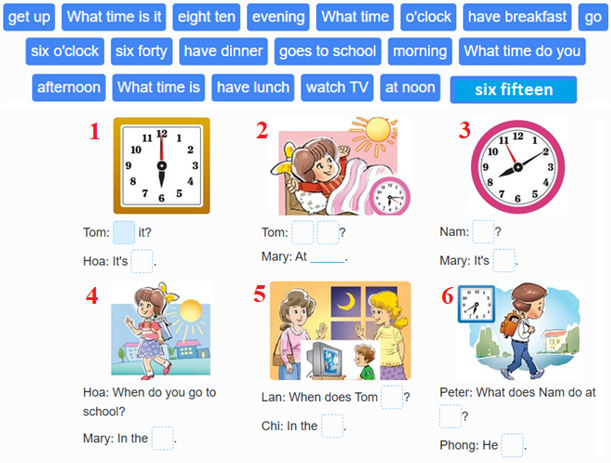
Bài 12. Choose the correct answers.
1. What does your grandfather do?
a. She's a doctor.
b. He's a doctor.
2. Where does he work?
a. He works in a hospital.
b. She works in a hospital.
3. What does your father do?
a. I am a farmer.
b. He's a farmer.
4. Where does he work?
a. She works on the farm.
b. He works on the farm.
5. What does your mother do?
a. She is a businesswoman.
b. She works in an office.
6. Where does she work?
a. She works in the hospital.
b. She is a nurse.
Bài 13. Rearrange the words to make the correct sentences.
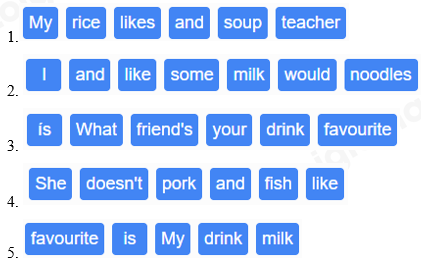
Bài 14. Rearrange the sentences to make a dialogue.
a. Ah, Mrs Lee. What does she do?
b. She is nice and friendly.
c. I don’t know her. Is she Kim’s mother?
d. She is a doctor.
e. Yes, she is.
f. Hi, Minh. Do you know your new neighbour?
g. She’s Mrs Lee.
h. Hi Thoa.
i. What does she look like?
j. What’s her name?
Bài 15. Read and write the missing words.
|
foods beds presents songs letters |
December 25th is called Christmas Day. In England, before Christmas, many children write (1) _____ to Santa Claus to get small presents. On Christmas Eve, English children hang stockings on their (2) _____. Santa Claus delivers the presents during the night. The children get up early on Christmas Day to open their (3) _____. At Christmas, English people sing carols. Carols are (4) _____ about Jesus. Lunch is usually the main meal of the day. The favourite English Christmas (5) _____ are roast turkey, mince pies and pudding.
Bài 16. Answer these questions about you.
1. Why do you want to go to the bakery?
2. Why do you want to go to the park?
3. Why do you want to go to the cinema?
4. Why do you want to go to the zoo?
5. Why do you want to go to the supermarket?
6. Why do you want to go to the sweet shop?
7. Why do you want to go to the toy shop?
Bài 17. Choose the correct word to complete the sentence.
1. It's Sunday today. Would you like to go _____?
a. on a picnic
b. for a picnic
2. _____ your phone number?
a. What's
b. What
3. My brother likes to go _____at weekend.
a. to fish b. fishing
4. Would you like __________ skating with me now?
a. going b. to go
5. How __________ is your dad’s new mobile phone?
a. much b. many
Bài 18. Match the questions with the appropriate answers.
|
1. How much is that scarf? 2. How much are these shoes? 3. Are these jeans 150,000 dong? 4. Is this jumper 80,000 dong? |
a. They’re 109,000 dong. b. No, it isn’t. It’s 50,000 dong. c. Yes, they are. d. It’s 59,000 dong. |
Bài 19. Complete the dialogue.
Teacher: What are you going to do this weekend?
Linda: _________.
Teacher: What animal do you want to see?
Linda: _________.

Bài 20. Complete the sentences with the words in the boxes.
|
going are stay at home do visit |
A: Where are Phong and Thu (1) ________ this summer?
B: They are going to (2) ________.
A: What are they going to (3) ________ at home?
B: They (4) ________ going to learn Japanese.
A: Why?
B: Because they are going to (5) ________ Japan.

-----------------THE END-----------------
Đáp án
HƯỚNG DẪN GIẢI
Thực hiện: Ban chuyên môn Loigiaihay.com
|
Bài 1. Read and choose the correct answer. (Đọc và chọn câu trả lời đúng.) 1. Hi, Jenny. Nice to meet you. a. Bye, Jenny. b. I'm fine. c. Nice to meet you, too. 2. Good morning. I'm Matt. a. Good morning, Matt. b. I'm ten. c. This is Jenny. 3. Good night, Lucy. a. Goodbye, daddy. b. Good night, daddy. c. Good evening, daddy. 4. Goodbye, Miss Hien. a. Good afternoon, Lisa. b. Bye. See you later, Lisa. c. Hello, Lisa. |
Cách giải:
1. c
Hi, Jenny. Nice to meet you. (Chào Jenny. Vui được gặp bạn.)
a. Bye, Jenny. (Tạm biệt, Jenny.)
b. I'm fine. (Mình khỏe.)
c. Nice to meet you, too. (Mình cũng rất vui khi gặp bạn.)
2. a
Good morning. I'm Matt. (Chào buổi sáng. Mình là Matt.)
a. Good morning, Matt. (Chào buổi sáng, Matt.)
b. I'm ten. (Mình 10 tuổi.)
c. This is Jenny. (Đây là Jenny.)
3. b
Good night, Lucy. (Chúc ngủ ngon, Lucy.)
a. Goodbye, daddy. (Tạm biệt bố.)
b. Good night, daddy. (Chúc bố ngủ ngon.)
c. Good evening, daddy. (Chào buổi tối, bố ạ.)
4. b
Goodbye, Miss Hien. (Tạm biệt cô Hiền ạ.)
a. Good afternoon, Lisa. (Chào buổi chiều, Lisa.)
b. Bye. See you later, Lisa. (Tạm biệt. Gặp bạn sau nhé, Lisa.)
c. Hello, Lisa. (Chào, Lisa.)
|
Bài 2. Make sentences from clues. (Viết câu từ các gợi ý.) 1. Who/ that/? _____________? 2. He/friend/. _____________. 3. What/ his/ full/? _____________? 4. His/ Tim Brown/. _____________. 5. Where/ he/ from/? _____________? 6. He/ America/. _____________. |
Cách giải:
1. Who is that? (Kia là ai?)
2. He is my friend. (Anh ấy là bạn của tôi.)
3. What is his full name? (Tên đầy đủ của anh ấy là gì?)
4. His full name is Tim Brown. (Tên đầy đủ của anh ấy là Tim Brown.)
5. Where is he from? (Anh ấy từ đâu đến?)
6. He is from America. (Anh ấy đến từ nước Mỹ.)
|
Bài 3. Write the words in order. (Viết các từ theo thứ tự.)
|
Cách giải:
1. I have Music on Wednesday s.
(Tôi có môn Âm nhạc vào thứ Tư.)
2. Mary visits her grandparents in the afternoon.
(Mary thăm ông bà vào buổi chiều.)
3. My father plays tennis on Sundays.
(Bố tôi chơi quần vợt vào Chủ nhật.)
4. Do they have English on Tuesdays?
(Họ có môn tiếng Anh vào thứ Ba à?)
5. What day is it today?
(Hôm nay là thứ mấy?)
|
Bài 4. Write the answers to the questions.
1. What's the date today, Nam? - It's ________. 2. When's Lucy's birthday? - It's on ________. 3. Today is my birthday. - It's on ________. 4. What's the date today, Dad? - It's ________. 5. When's your birthday, Tony? - It's on ________. 6. When's your mother's birthday? - It's on ________. |
Phương pháp giải:
Cách nói ngày tháng:
- the + ngày dạng số thứ tự + of + tháng
- tháng + ngày dạng số thứ tự
Cách giải:
1. What's the date today, Nam? - It's July 2nd. / It’s the second of July.
(Hôm nay là ngày mấy, Nam? – Ngày 2 tháng 7.)
2. When's Lucy's birthday? - It's on August 7th. / It’s on the seventh of August.
(Khi nào là sinh nhật của Lucy? – Ngày 7 tháng 8.)
3. Today is my birthday. It's on December 24th. / It’s on the 24th of December.
(Hôm nay là sinh nhật của tôi. Đó là ngày 24 tháng 12.)
4. What's the date today, Dad? - It's June 15th. / It’s the 15th of June.
(Hôm nay là ngày mấy ạ bố? – Ngày 15 tháng 6.)
5. When's your birthday, Tony? - It's on June 1st. / It’s on the first of June.
(Khi nào là sinh nhật của bạn, Tony? – Là ngày 1 tháng 6.)
6. When's your mother's birthday? - It's on September 5th. / It’s on the fifth of September.
(Khi nào là sinh nhật của mẹ bạn? – Ngày 5 tháng 9.)
|
Bài 5. Match the questions with the appropriate answers. (Nối các câu hỏi với câu trả lời thích hợp.)
|
Cách giải:
1 – d: Can you play chess? - No, I can’t.
(Bạn có thể chơi cờ vua không? - Không, tôi không thể.)
2 – b: What can you do? - I can do a magic tick.
(Bạn có thể làm gì? - Tôi có thể làm chiếc que phép thuật.)
3 – a: What can he do? - He can ride the pony.
(Anh ấy có thể làm gì? - Anh ấy có thể cưỡi ngựa.)
4 – c: Can he use the chopsticks? - No, he can’t. He can use the spoons only.
(Anh ấy có thể dùng đũa không? - Không, anh ấy không thể. Anh ấy chỉ có thể sử dụng thìa.)
|
Bài 6. Reorder the words to make the correct sentences. (Sắp xếp lại các từ để tạo thành câu đúng.) 1. is/ . / 4A / in / Class / Hoa 2. ? / you / in / What / are / class 3. . / school / My / is / in / street / Quang Trung 4. Primary / school / Hoa / Where / Sen / is / ? 5. a / small / village / Her / school / is / . / in |
Cách giải:
1. Hoa is in Class 4A. (Hoa học lớp 4A.)
2. What class are you in? (Bạn học lớp nào?)
3. My school is in Quang Trung street. (Trường học của tôi ở đường Quang Trung.)
4. Where is Hoa Sen Primary school? (Trường tiểu học Hoa Sen ở đâu?)
5. Her school is in a small village. (Trường học của cô ấy ở trong một ngôi làng nhỏ.)
|
Bài 7. Write the missing letters. (Viết các chữ cái bị thiếu.) |
Phương pháp giải:
take photograph: chụp ảnh
fly a kite: thả diều
ride a bike: đi xe đạp
watch TV: xem truyền hình
read: đọc
hobby: sở thích
collect stamps: sưu tầm tem
Cách giải:
1. He likes taking photograph. (Anh ấy thích chụp ảnh.)
2. We like flying a kite in the afternoon. (Chúng tôi thích thả diều vào buổi chiều.)
3. Tuan likes riding a bike after school. (Tuấn thích đi xe đạp sau giờ học.)
4. He likes watching TV. (Anh ấy thích xem truyền hình.)
5. Reading is her hobby. (Đọc là sở thích của cô ấy.)
6. I like collecting stamps. (Tôi thích sưu tầm tem.)
|
Bài 8. Fill the missing words. (Điền từ còn thiếu vào các chỗ trống.)
1. What _______ do you have today? 2. Maths, Art, and Music. 3. What's your _______ subject? 4. Oh, I _______ English. 5. _______ do you have English? 6. I have it _______ Mondays, Tuesdays, Thursdays and Friday. |
Phương pháp giải:
love (v): yêu thích
Science (n): môn Khoa học
favourite (adj): yêu thích
subjects (n): các môn học
when: khi nào
on (prep): trên
Cách giải:
1. What subjects do you have today?
(Hôm nay bạn có môn học gì?)
2. Maths, Art, Science and Music.
(Toán, Mĩ thuật, Khoa học và Âm nhạc.)
3. What's your favourite subject?
(Môn học yêu thích của bạn là gì?)
4. Oh, I love English.
(Ồ, mình thích môn tiếng Anh.)
5. When do you have English?
(Khi nào bạn có môn tiếng Anh?)
6. I have it on Mondays, Tuesdays, Thursdays and Friday.
(Tôi có môn học đấy vào thứ Hai, thứ Ba, thứ Năm và thứ Sáu.)
|
Bài 9. Write the words in order to make the correct sentences. (Viết các từ theo thứ tự để tạo thành câu đúng.) 1. English/ she/ Is/ speaking/ aloud/ ? _________? 2. These/ are / games/ ./ pupils/ playing _________. 3. girls / listening / music/ ?/ two/ Are/ to _________? 4. are/ into / our/ running/ desks / quickly/ ./ We _________. 5. your/ in front of / teacher / ?/ standing / the / Is/ door _________? 6. Some/ reading/ boys and girls/ are/ English/ books/. _________. |
Cách giải:
1. Is she speaking English aloud?
(Cô ấy có đang nói to tiếng Anh không?)
2. These pupils are playing games.
(Những học sinh này đang chơi trò chơi.)
3. Are two girls listening to music?
(Hai bạn nữ đang nghe nhạc à?)
4. We are running quickly into our desks.
(Chúng tôi đang chạy nhanh về bàn học của chúng tôi.)
5. Is your teacher standing in front of the door?
(Giáo viên của bạn đang đứng trước cửa à?)
6. Some boys and girls are reading English books.
(Một vài bạn nam và bạn nữ đang đọc sách Tiếng Anh.)
|
Bài 10. Write the missing letters. (Viết chữ cái còn thiếu.)
1. Tom: What d_____ you do? Mary: I w____ the f____ in the garden. 2. Bill: What d____ your brother do after dinner? Nam: He w____ TV. 3. Bill: D___ you fly a kite after school? Nam: No, I d____n't. I played chess with Quan. 4. Phong: Wh___ we you yesterday? Peter: I w____ at the z____ with my family. 5. Phong: Was Tony at the b____ yesterday? Nam: No, he wa____n't. He was at home. |
Phương pháp giải:
Thì quá khứ đơn:
- Dạng khẳng định: S + Ved
- Dạng câu hỏi: Wh-word + did + S + V (nguyên thể)?
Did + S + V(nguyên thể)?
- S (số ít) + was (not)
water the flowers: tưới hoa
watch TV: xem tivi
be at the zoo: ở sở thú
at the beach: ở bãi biển
Cách giải:
1. Tom: What did you do?
(Bạn đã làm gì?)
Mary: I watered the flowers in the garden.
(Mình đã tưới hoa trong vườn.)
2. Bill: What did your brother do after dinner?
(Em trai bạn làm gì sau bữa tối?)
Nam: He watched TV.
(Em ấy đã xem tivi.)
3. Bill: Did you fly a kite after school?
(Bạn đã thả diều sau giờ học à?)
Nam: No, I didn't. I played chess with Quan.
(Mình không. Mình đã chơi cờ với Quân.)
4. Phong: Where we you yesterday?
(Hôm qua bạn đã ở đâu?)
Peter: I was at the zoo with my family.
(Mình đã ở sở thú với gia đình.)
5. Phong: Was Tony at the beach yesterday?
(Hôm qua Tony đã ở bãi biển à?)
Nam: No, he wasn't. He was at home.
(Không. Anh ấy đã ở nhà.)
|
Bài 11. Choose the correct words/ phrases in the box to complete the sentences. (Chọn từ/ cụm từ đúng trong khung để hoàn thành các câu.)
|
Phương pháp giải:
- get up: thức dậy
- What time is it: mấy giờ rồi
- eight ten: 8 giờ 10 phút
- evening: buổi tối
- What time: mấy giờ
- giờ tròn + o’clock
- have breakfast: ăn sáng
- go: đi
- six o’clock: 6 giờ
- six forty: 6 giờ 40 phút
- have dinner: ăn tối
- S (số ít) + goes to school: đi học
- morning: buổi sáng
- What time do you + động từ nguyên thể: Bạn làm việc gì lúc mấy giờ?
- afternoon: buổi chiều
- have lunch: ăn trưa
- watch TV: xem truyền hình
- at noon: lúc 12 giờ trưa
- six fifteen: 6 giờ 15 phút
Cách giải:
1. Tom: What time is it? (Mấy giờ rồi?)
Hoa: It’s six o’clock. (6 giờ rồi.)
2. Tom: What time do you get up? (Bạn thức dậy lúc mấy giờ?)
Mary: At six fifteen. (Lúc 6 giờ 15 phút.)
3. Nam: What time is it? (Mấy giờ rồi?)
Mary: It’s eight ten. (8 giờ 10 phút.)
4. Hoa: When do you go to school? (Khi nào bạn đi học?)
Mary: In the morning. (Vào buổi sáng.)
5. Lan: When does Tom watch TV? (Tom xem tivi khi nào?)
Chi: In the evening. (Vào buổi tối.)
6. Peter: What does Nam do at six forty? (Nam làm gì lúc 6:40.)
Phong: He goes to school. (Anh ấy đi học.)
|
Bài 12. Choose the correct answers. (Chọn câu trả lời đúng.) 1. What does your grandfather do? a. She's a doctor. b. He's a doctor. 2. Where does he work? a. He works in a hospital. b. She works in a hospital. 3. What does your father do? a. I am a farmer. b. He's a farmer. 4. Where does he work? a. She works on the farm. b. He works on the farm. 5. What does your mother do? a. She is a businesswoman. b. She works in an office. 6. Where does she work? a. She works in the hospital. b. She is a nurse. |
Cách giải:
1. b
What does your grandfather do? (Ông bạn làm nghề gì?)
a. She's a doctor. (Bà mình là bác sĩ.)
b. He's a doctor. (Ông mình là bác sĩ.)
Giải thích:Câu hỏi dùng chủ ngữ là "grandfather" (ông) nên câu trả lời phải dùng đại từ "he" (ông ấy) để thay thế.
2. a
Where does he work? (Anh ấy làm việc ở đâu?)
a. He works in a hospital. (Anh ấy làm việc ở bệnh viện.)
b. She works in a hospital. (Cô ấy làm việc ở bệnh viện.)
Giải thích: Câu hỏi dùng chủ ngữ là "he" nên câu trả lời phải dùng đại từ "he".
3. b
What does your father do? (Bố bạn làm nghề gì?)
a. I am a farmer. (Mình là nông dân.)
b. He's a farmer. (Bố mình là nông dân.)
Giải thích: Câu hỏi dùng chủ ngữ là "father" (bố) nên câu trả lời phải dùng đại từ "he" (ông ấy) để thay thế.
4. b
Where does he work? (Anh ấy làm việc ở đâu?)
a. She works on the farm. (Cô ấy làm việc ở nông trại.)
b. He works on the farm. (Anh ấy làm việc trên nông trại.)
Giải thích: Câu hỏi dùng chủ ngữ là "he" nên câu trả lời phải dùng đại từ "he".
5. a
What does your mother do? (Mẹ bạn làm nghề gì?)
a. She is a businesswoman. (Mẹ mình là nữ doanh nhân.)
b. She works in an office. (Mẹ mình làm việc trong văn phòng.)
Giải thích: Câu hỏi về nghề nghiệp nên câu trả lời cũng phải nói về nghề nghiệp tương ứng.
6. a
Where does she work? (Cô ấy làm việc ở đâu?)
a. She works in the hospital. (Cô ấy làm việc ở bệnh viện.)
b. She is a nurse. (Cô ấy là y tá.)
Giải thích: Câu hỏi về nơi làm việc nên câu trả lời cũng phải nói về địa điểm tương ứng.
|
Bài 13. Rearrange the words to make the correct sentences. (Sắp xếp các từ để tạo thành câu đúng.)
|
Cách giải:
1. My teacher likes rice and soup.
(Giáo viên của tôi thích cơm và canh.)
2. I would like some milk and noodles.
(Tôi muốn một ít sữa và mì.)
3. What is your friend’s favourite drink?
(Đồ uống yêu thích của bạn em là gì?)
4. She doesn’t like pork and fish.
(Cô ấy không thích thịt lợn và cá.)
5. My favourite drink is milk.
(Thức uống yêu thích của tôi là sữa.)
|
Bài 14. Rearrange the sentences to make a dialogue. (Sắp xếp các câu để tạo thành bài hội thoại.) a. Ah, Mrs Lee. What does she do? b. She is nice and friendly. c. I don’t know her. Is she Kim’s mother? d. She is a doctor. e. Yes, she is. f. Hi, Minh. Do you know your new neighbour? g. She’s Mrs Lee. h. Hi Thoa. i. What does she look like? j. What’s her name? |
Cách giải:
1 - h. Hi Thoa.
(Chào Thoa.)
2 - f. Hi, Minh. Do you know your new neighbour?
(Chào, Minh. Bạn có biết hàng xóm mới của bạn không?)
3 - c. I don’t know her. Is she Kim’s mother?
(Tôi không biết cô ấy. Cô ấy có phải là mẹ của Kim không?)
4 - e. Yes, she is.
(Vâng, đúng vậy.)
5 - j. What’s her name?
(Cô ấy tên gì?)
6 - g. She’s Mrs Lee.
(Cô ấy tên Lee.)
7 - a. Ah, Mrs Lee. What does she do?
(À, cô Lee. Cô ấy làm nghề gì?)
8 - d. She is a doctor.
(Cô ấy là bác sĩ.)
9 - i. What does she look like?
(Cô ấy trông như thế nào?)
10 - b. She is nice and friendly.
(Cô ấy tốt bụng và thân thiện.)
|
Bài 15. Read and write the missing words. (Đọc và viết các từ còn thiếu.)
December 25th is called Christmas Day. In England, before Christmas, many children write (1) _____ to Santa Claus to get small presents. On Christmas Eve, English children hang stockings on their (2) _____. Santa Claus delivers the presents during the night. The children get up early on Christmas Day to open their (3) _____. At Christmas, English people sing carols. Carols are (4) _____ about Jesus. Lunch is usually the main meal of the day. The favourite English Christmas (5) _____ are roast turkey, mince pies and pudding. |
Phương pháp giải:
foods: thức ăn
beds: cái giường
presents: món quà
songs: những bài hát
letters: bức thư
Cách giải:
December 25th is called Christmas Day. In England, before Christmas, many children write (1) letters to Santa Claus to get small presents. On Christmas Eve, English children hang stockings on their (2) beds. Santa Claus delivers the presents during the night. The children get up early on Christmas Day to open their (3) presents. At Christmas, English people sing carols. Carols are (4) songs about Jesus. Lunch is usually the main meal of the day. The favourite English Christmas (5) foods are roast turkey, mince pies and pudding.
Tạm dịch:
Ngày 25 tháng 12 được gọi là Ngày lễ Giáng sinh. Ở Anh, trước lễ Giáng sinh, nhiều trẻ em viết thư cho ông già Noel để nhận những món quà nhỏ. Vào đêm Giáng sinh, trẻ em Anh treo tất trên giường của chúng. Ông già Noel phát quà trong đêm. Những đứa trẻ dậy sớm vào ngày Giáng sinh để mở món quà của chúng. Vào lễ Giáng sinh, người Anh hát những bài hát mừng. Carols là bài hát về Chúa Giêsu. Bữa trưa thường là bữa ăn chính trong ngày. Các món ăn yêu thích của người Anh trong lễ Giáng sinh là gà tây quay, bánh nướng băm và bánh pudding.
|
Bài 16. Answer these questions about you. (Trả lời những câu hỏi này về bản thân em.) 1. Why do you want to go to the bakery? 2. Why do you want to go to the park? 3. Why do you want to go to the cinema? 4. Why do you want to go to the zoo? 5. Why do you want to go to the supermarket? 6. Why do you want to go to the sweet shop? 7. Why do you want to go to the toy shop? |
Cách giải:
1. Why do you want to go to the bakery? => Because I want to buy some bread.
(Tại sao bạn muốn đến tiệm bánh? => Vì tôi muốn mua một ít bánh mì.)
2. Why do you want to go to the park? => Because I want to ride my bike in the park.
(Tại sao bạn muốn đến công viên? => Bởi vì tôi muốn đi xe đạp trong công viên.)
3. Why do you want to go to the cinema? => Because I want to see my favourite movie.
(Tại sao bạn muốn đến rạp chiếu phim? => Vì tôi muốn xem bộ phim yêu thích của mình.)
4. Why do you want to go to the zoo? => Because I want to see monkeys and elephants.
(Tại sao bạn muốn đến sở thú? => Vì tôi muốn xem khỉ và voi.)
5. Why do you want to go to the supermarket? => Because I want to buy some groceries.
(Tại sao bạn muốn đi siêu thị? => Vì tôi muốn mua một số hàng tạp hóa.)
6. Why do you want to go to the sweet shop? => Because I want to buy some candy and cakes.
(Tại sao bạn muốn đến cửa hàng đồ ngọt? => Vì tôi muốn mua một ít kẹo và bánh.)
7. Why do you want to go to the toy shop? => Because I want to buy some toys.
(Tại sao bạn muốn đến cửa hàng đồ chơi? => Vì tôi muốn mua một số đồ chơi.)
|
Bài 17. Choose the correct word to complete the sentence. (Chọn từ đúng để hoàn thành câu.) 1. It's Sunday today. Would you like to go _____? a. on a picnic b. for a picnic 2. _____ your phone number? a. What's b. What 3. My brother likes to go _____at weekend. a. to fish b. fishing 4. Would you like __________ skating with me now? a. going b. to go 5. How __________ is your dad’s new mobile phone? a. much b. many |
Cách giải:
1. b
It's Sunday today. Would you like to go for a picnic?
(Hôm nay là Chủ nhật. Bạn muốn đi dã ngoại không?)
Giải thích:Cụm từ “go for a picnic” (đi dã ngoại).
2. a
What’s your phone number?
(Số điện thoại của bạn là gì?)
Giải thích: What’s = What is, trong câu hỏi cần có động từ để tạo thành câu hoàn chỉnh.
3. b
My brother likes to go fishing at weekend.
(Anh tôi thích đi câu cá vào cuối tuần.)
Giải thích:Cụm từ “go fishing” (đi câu cá).
4. b
Would you like to go skating with me now?
(Hiện tại bạn muốn đi trượt ba tanh với mình không?)
Giải thích: Cấu trúc “Would you like + to V…?”
5. a
How much is your dad’s new mobile phone?
(Điện thoại di động mới của bố bạn giá bao nhiêu?)
Giải thích: Cấu trúc để hỏi về giá cả của đồ vật “How much + is + danh từ số ít?”.
|
Bài 18. Match the questions with the appropriate answers. (Nối các câu hỏi với các câu trả lời thích hợp.)
|
Cách giải:
1 – d: How much is that scarf? - It’s 59,000 dong.
(Chiếc khăn quàng cổ đó bao nhiêu tiền? - 59.000 đồng.)
Giải thích: Cấu trúc hỏi giá cả của 1 món đồ “How much + is + danh từ số ít?” => Trả lời: dùng đại từ “it” thay cho danh từ “that scarf”.
2 – a: How much are these shoes? - They’re 109,000 dong.
(Đôi giày này bao nhiêu tiền? - Chúng có giá 109.000 đồng.)
Giải thích: Cấu trúc hỏi giá cả của từ 2 món đồ trở lên “How much + are + danh từ số nhiều?” => Trả lời: dùng đại từ “they” thay cho danh từ “these shoes”.
3 – c: Are these jeans 150,000 dong? - Yes, they are.
(Cái quần jean này có phải là 150.000 đồng không? - Đúng vậy.)
Giải thích: Câu hỏi là “are these jeans” => câu trả lời dùng “they are”.
4 – b: Is this jumper 80,000 dong? - No, it isn’t. It’s 50,000 dong.
(Bộ áo liền quần này có phải là 80.000 đồng không? - Không. Đó có giá 50.000 đồng.)
Giải thích: Câu hỏi là “Is this jumper” => câu trả lời dùng “it is”.
|
Bài 19. Complete the dialogue. (Hoàn thành bài hội thoại.) Teacher: What are you going to do this weekend? Linda: _________. Teacher: What animal do you want to see? Linda: _________.
|
Cách giải:
Teacher: What are you going to do this weekend?
(Giáo viên: Em định làm gì vào cuối tuần này?)
Linda: I’m going to the zoo.
(Em định đi sở thú ạ.)
Teacher: What animal do you want to see?
(Em muốn xem động vật gì?)
Linda: I want too see tigers.
(Em muốn xem những con hổ ạ.)
|
Bài 20. Complete the sentences with the words in the box. (Hoàn thành các câu với các từ trong khung.)
A: Where are Phong and Thu (1) ________ this summer? B: They are going to (2) ________. A: What are they going to (3) ________ at home? B: They (4) ________ going to learn Japanese. A: Why? B: Because they are going to (5) ________ Japan.
|
Phương pháp:
Câu hỏi thì hiện tại tiếp tiếp diễn: Wh-word + are + chủ ngữ
Chủ ngữ số nhiều + are
Thì tương lai gần: chủ ngữ số nhiều + are going to + V
stay at home: ở nhà
do (v): làm
visit (v): tham quan
Cách giải:
A: Where are Phong and Thu (1) going this summer?
(Phong và Thu định đi đâu vào mùa hè này?)
B: They are going to (2) stay at home.
(Họ định ở nhà.)
A: What are they going to (3) do at home?
(Họ định làm gì ở nhà?)
B: They (4) are going to learn Japanese.
(Họ định học tiếng Nhật.)
A: Why?
(Vì sao?)
B: Because they are going to (5) visit Japan.
(Vì họ định tham quan nước Nhật.)
-----------------THE END----------------








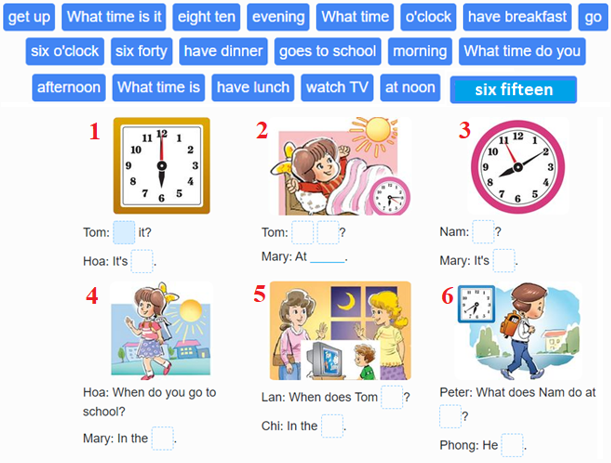










Danh sách bình luận